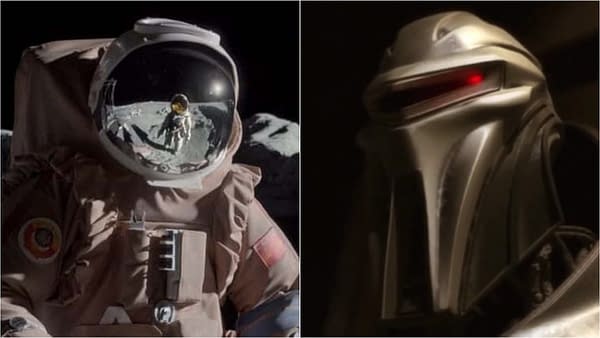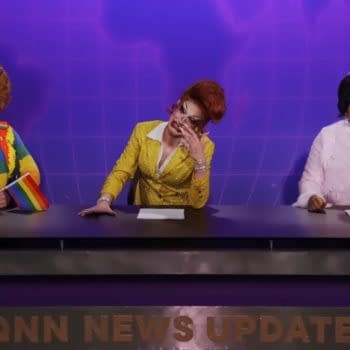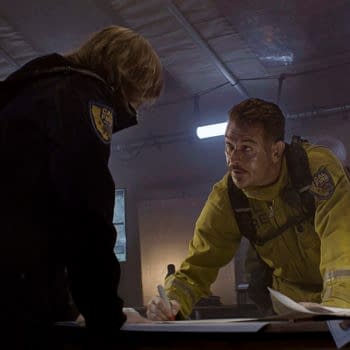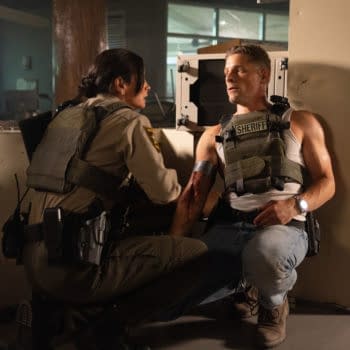Posted in: Apple, SYFY, TV | Tagged: apple, battlestar galactica, bleeding cool, cable, Cylons, for all mankind, nasa, opinion, ronald d. moore, sci-fi, streaming, syfy, television, tv
For All Mankind: The Real Sci-Fi Battlestar Galactica Should've Been
Yes, a bold statement from me but not only do I stand by it, but I can prove it. What's that? You haven't seen For All Mankind because you don't have Apple TV+? One? Shame on you. Two? You should watch it because it takes all other wanna-be sci-fi series to task and shows them how it's done. Now, as a note, I'm just dealing with the 2004 reboot series of Battlestar Galactica here. Why? Because both series are written and created by Sci-Fi icon Ronald D. Moore. They're both great…but one is far superior and makes the other look like a second rate bedtime story that riffs on other classic science fiction series. For starters, let's look at the synopsis of each show.

For All Mankind is a "What If…?" take on space history, answering the question, "How would things have been different if the USA hadn't put the first man on the moon?" It follows the actual historical players in the space saga as they navigate situations how they could have been. Russia puts a woman on the moon? We have to double-down and train female astronauts. What else can we be first in, since we were second to the moon? Oh! How about building a lunar base to discover ice on the moon, and actually launching the Sea Dragon! With advancements happening earlier in history, what does the present and future look like then, in this timeline?
Battlestar Galactica doesn't start until way in the future, once humanity has established itself as a presence in space. Of course, their intergalactic presence got the attention of the big bad robot race called Cylons, who want to wipe out all of humanity. Cue a massive war and humanity fleeing the planet and living in a fleet of space ships, trying to save themselves and kill all the alien robots who frankly have vexingly advanced technology. Oh, and the fleet is all military and the viper pilots are unparalleled bad-assess.
Now that you're up to speed on both shows, I'll tell you why For All Mankind is better science fiction by far. It's historical, yes, but it takes what we know already and turns it on its ear. Yes, everybody knows about the space race and The Cold War and how the United States has a hard-on for fighting Communism, but that's what makes it so perfect: it takes what we know and twists it into fiction. It's the perfect blend of science fiction because it has such a strong root in reality that they can't just throw out some futuristic technobabble to explain how we got from point A to point B – it all has to feel real.
We already know TV isn't real – everyone's perfect and it all works out great for the main characters after all. You don't have to rub in in our faces with awesome future technology, like being able to get off this planet and away from terrible humans. I don't want the hero to save the sexy woman and everything be alright by the end of the episode. I want you to take risks, I want to be in the story without knowing where it's taking me. The perfect story ties you up, duct tapes your mouth, throws you in the trunk, and doesn't let you know where you're going until you get out and you're suddenly at the most magical beach.
That's what a great television show should do – it shouldn't telegraph where it's going or tie itself to convention for the sake of ratings or the "casual viewership" demographic. Give me a show that surprises me, makes me ask, "Did they just do that?" and question if what they did was actually possible. A good science fiction show is lost without a basis in reality, and For All Mankind plants its flag firmly in facts – actual science facts, and it builds its drama and stories around events that happened as well as extrapolations of how events would have played out had things gone differently.
Science fiction is about pushing boundaries, questioning convention, and forcing the viewer to think critically about what they're watching. Battlestar Galactica is enjoyable, don't get me wrong, but it's not true science fiction for me: it's a fantasy series that happens to be set in space. Let's face it: how close to a future where we have fleets of space ships fighting wars like the allied forces in the Pacific Ocean? At the rate humanity is going now, not likely ever.
However, the way things could have gone in the past is very much riffing on facts and allowing everything to play naturally within the framework of reality and science, just with fictional elements. That's why For All Mankind represents true science fiction for me, and nowhere like the space opera fantasy of Battlestar Galactica.














